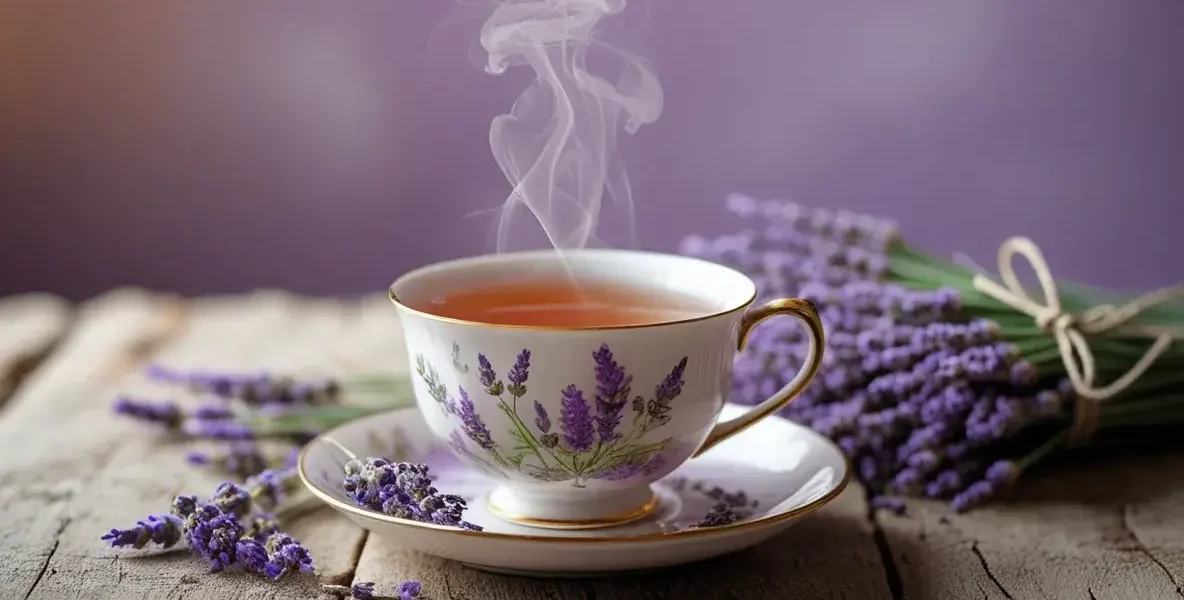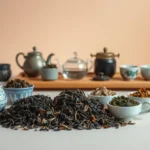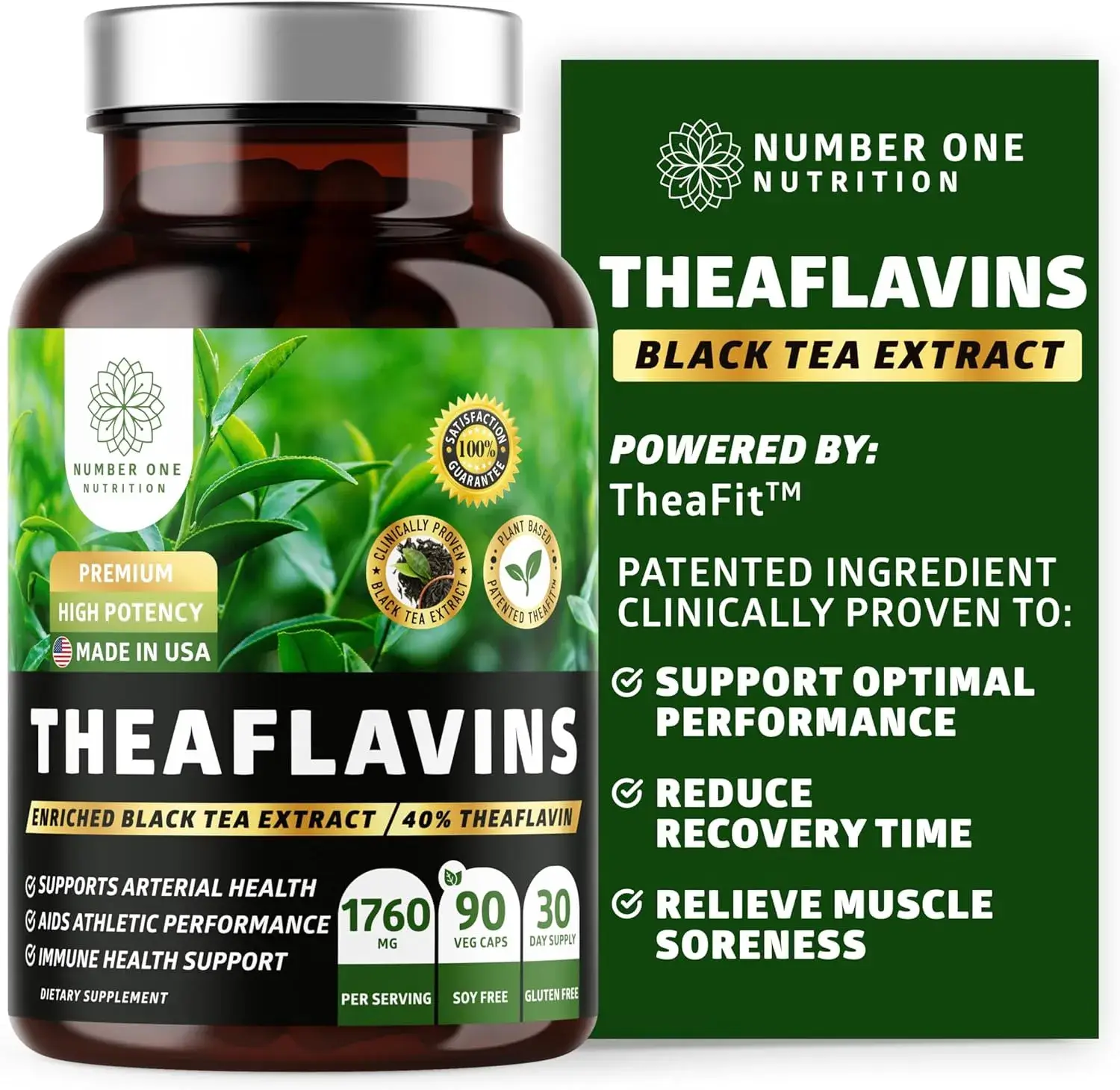Table of Contents
Does lavender tea make you sleepy? According to national institutes of health in the USA including the CDC, an estimated 70 million people suffer from some type of sleep disorder. If you’re among those struggling with sleepless nights, you might be searching for natural remedies to help you drift off more easily.
I’ve found that lavender tea is often recommended as a natural sleep aid, and for good reason. Studies have shown that drinking lavender tea before bed can help you achieve more restful sleep. In fact, lavender tea boosts the production of dopamine and reduces cortisol, the stress hormone. Additionally, research suggests that lavender may improve your body’s melatonin levels, which can enhance overall sleep quality.
In this article, we’ll explore the science behind lavender tea’s sleep-inducing properties, examine its other health benefits, and share practical tips on how to incorporate this soothing beverage into your bedtime routine. Whether you’re dealing with occasional sleeplessness or chronic insomnia, understanding how lavender tea affects your body might be the key to better sleep.
What is Lavender Tea and How Does It Work?
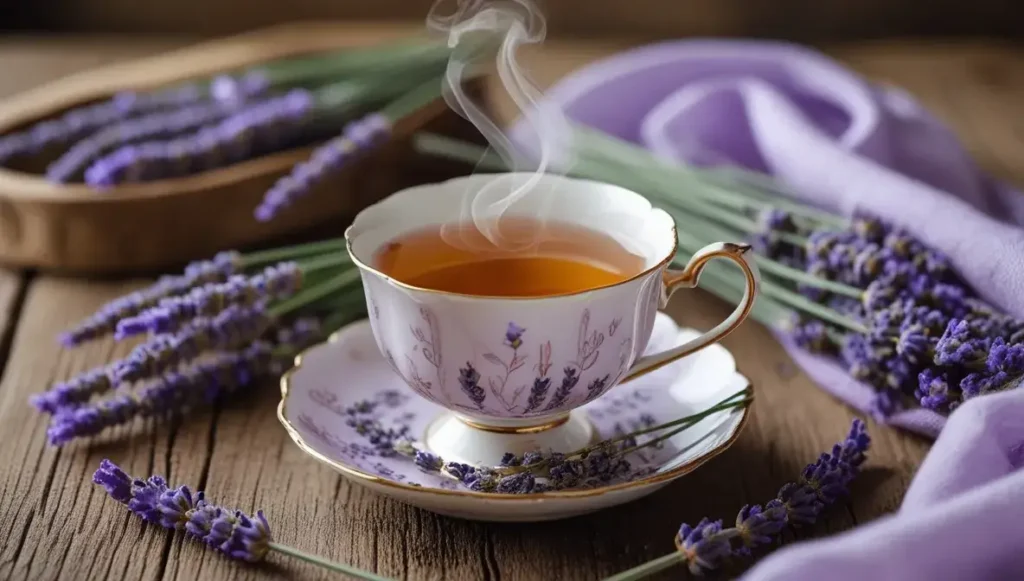
Lavender tea has been treasured for centuries as both a delightful beverage and a natural remedy. Let’s explore what makes this purple flowering herb such a powerful sleep promoter.
Origin and composition of lavender tea
Lavender (Lavandula angustifolia), also known as English lavender, true lavender, or common lavender, belongs to the mint (Lamiaceae) family. This perennial evergreen plant originated in the Mediterranean region, particularly in areas like Greece, Italy, France, Spain, and surrounding countries. The name “lavender” comes from the Latin word “lavare,” meaning “to wash”, reflecting its historical use in baths by Romans for cleansing and purification.
Historically, lavender’s use spans approximately 2,500 years. Ancient Egyptians used it in mummification, while Greeks, Romans, and Persians added it to their baths to purify both body and mind. During the Middle Ages, lavender became known as a holy herb with significant healing powers.
Lavender tea is typically made from the dried buds of lavender flowers. The plant produces essential oils concentrated in oil glands between the sebaceous glands and tiny hairs on the calyx surface. These essential oils occur in concentrations ranging from 2% to 3% and contain numerous compounds including terpenes, alcohols, ketones, polyphenols, coumarins, flavonoids, anthocyanins, phytosterols, and various acids.
How lavender affects the nervous system
Lavender’s remarkable calming effects stem from its unique interaction with our nervous system. One primary mechanism involves its impact on gamma-aminobutyric acid (GABA) receptors. Linalool, a major component of lavender, has an inhibitory effect through these GABA-A receptors, which creates a sedative effect in the brain.
This activity inhibits the limbic system—your brain’s emotional center—reducing anxiety and promoting relaxation. When consumed as tea, lavender’s aromatic compounds stimulate the release of several important neurotransmitters: encephalin, endorphin, noradrenaline, and serotonin. These brain chemicals collectively create lavender’s powerful calming effects.
Furthermore, lavender modulates glutamate receptors and inhibits calcium channels. It also affects serotonergic factors, specifically the serotonin transporter (SERT), which explains its antidepressant-like properties. When drinking lavender tea, these mechanisms work together to slow down central nervous system activity, making it easier to relax and fall asleep.
Key compounds: linalool and linalyl acetate
Two star players in lavender’s chemical composition are linalool and linalyl acetate. These natural compounds create lavender’s distinctive aroma and deliver its therapeutic benefits. Linalool concentrations in lavender range from 9.3% to 68.8%, while linalyl acetate makes up between 1.2% and 59.4%.
Linalool shows remarkable anxiety-reducing effects that promote calmness and social interaction while reducing aggressive behavior. It functions as an anxiolytic (anti-anxiety agent) and helps suppress motor activity by binding to glutamate, an important excitatory neurotransmitter. Scientists believe this GABA enhancement is responsible for lavender’s hypnotic and anticonvulsant properties.
Linalyl acetate, lavender’s other key compound, works synergistically with linalool to provide anti-inflammatory benefits. Studies show that both compounds reduced edema (swelling) after systemic administration, though linalyl acetate’s effects were “less relevant and more delayed than that of the corresponding alcohol”. This suggests linalyl acetate may function as a pro-drug, gradually converting to its active form in the body.
Together, these compounds create what researchers describe as a “synergistic relationship” that makes lavender tea particularly effective for relaxation and sleep promotion.
Does Lavender Tea Make You Sleepy?
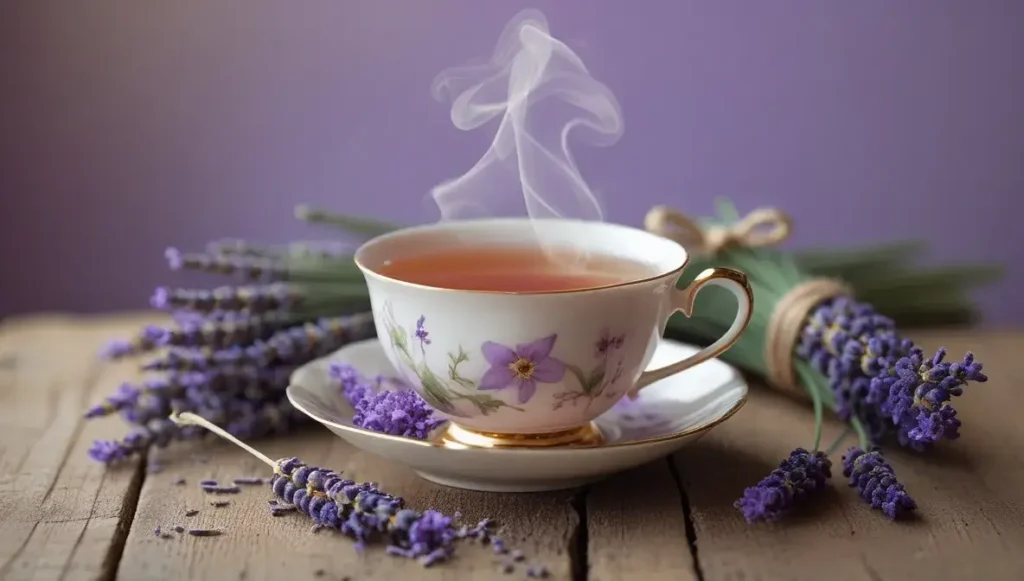
Looking at scientific research, many people wonder – does lavender tea actually help with sleep, or is it just another wellness myth? I’ve examined the evidence and found compelling research that supports lavender’s sleep-promoting properties.
Scientific studies on lavender and sleep
Research shows promising results for lavender tea as a sleep aid. In one notable study, postpartum women who drank one cup of lavender tea daily for two weeks experienced significantly less fatigue compared to those who didn’t. Moreover, research involving older adults demonstrated that lavender tea effectively decreased symptoms of depression and anxiety, both common contributors to insomnia.
The scientific evidence extends beyond just tea consumption. A randomized controlled trial with college students experiencing self-reported sleep issues found that combining proper sleep hygiene with lavender inhalation improved sleep quality both immediately after intervention and at a two-week follow-up assessment. This suggests lavender may have lasting effects on sleep patterns rather than just providing temporary relief.
Elderly patients with poor sleep quality showed significant improvements after drinking lavender tea. Interestingly, a study comparing different dosages found that 2g lavender tea bags produced better sleep quality improvements than 1g tea bags, with benefits becoming apparent after just one month of regular consumption.
Lavender’s effect on melatonin and cortisol
One reason lavender tea helps with sleep involves its impact on crucial sleep-regulating hormones. Research indicates that lavender may increase the body’s melatonin levels, often called the “sleep hormone,” which helps regulate sleep-wake cycles. This effect helps explain why drinking lavender before bedtime can make falling asleep easier.
Simultaneously, lavender helps reduce cortisol levels in the body. Since cortisol is known as the “stress hormone,” elevated levels can make relaxation and sleep difficult. By lowering cortisol, lavender creates a more conducive internal environment for quality sleep.
The mechanism behind these hormonal effects involves lavender’s active compounds interacting with neurotransmitters. Lavender activates gamma-aminobutyric acid (GABA), a neurotransmitter that produces calming effects and plays a major role in reducing hyperactivity associated with anxiety, stress, and fear. This action resembles how some prescription sleep medications work, but without the same side effect profile.
Comparison with other sleep teas
Compared to other herbal sleep remedies, lavender offers distinct advantages. Unlike chamomile, which provides gentle, ongoing sleep support, lavender acts as a faster-acting remedy for acute stress relief and sensory relaxation. This makes lavender tea particularly useful for those who need quick help unwinding before bed.
However, not all studies show long-term benefits. Some research suggests lavender’s sleep-improving effects might be short-term, with benefits diminishing after about four weeks of continuous use. Yet, this contrasts with other studies that found significant improvements in sleep quality after three months of regular lavender tea consumption.
For those concerned about safety, lavender tea has been recognized as “generally recognized as safe” by the U.S. Food and Drug Administration. This makes it an attractive option for those seeking natural sleep remedies without worrying about serious side effects.
Despite varying results across studies, the overall research trend points toward lavender being beneficial for sleep, especially when incorporated as part of a consistent bedtime ritual that includes taking time to appreciate the tea’s aroma.
👉 Experience the Premium Lavender Tea That Transforms Your Sleep Tonight 👈
Other Proven Health Benefits of Lavender Tea
Beyond its renowned sleep-inducing properties, lavender tea offers a remarkable array of health benefits backed by scientific research. From fighting inflammation to calming anxiety, this versatile herbal beverage deserves a spot in your wellness routine.
Reduces inflammation and pain
Lavender tea contains potent anti-inflammatory compounds that help alleviate various types of pain. Studies reveal that young women who inhaled lavender scent for just 30 minutes daily during the first three days of their menstrual cycle experienced significantly less pain compared to control groups. This pain-relieving effect stems from lavender’s ability to decrease pro-inflammatory cytokine production, particularly IL-8 and IL-1β. First and foremost, these benefits come from key compounds like linalool and linalyl acetate, which reduce muscle spasms while calming the body. Consequently, lavender tea can help minimize inflammation in muscles and joints, potentially preventing serious conditions associated with chronic inflammation.
Supports digestion and gut health
The digestive benefits of lavender tea are equally impressive. Its antispasmodic properties effectively relieve irritated stomach muscles, making it valuable for addressing issues such as bloating, nausea, and uncomfortable gas. Apart from soothing the stomach directly, the aromatic compounds in lavender stimulate bile production, which facilitates more efficient breakdown of food throughout the digestive system. Indeed, lavender contains linalool essential oil with specific carminative, tonic, and digestive actions that improve overall gut function. For anyone experiencing digestive discomfort, a warm cup of lavender tea can provide gentle yet effective relief.
Boosts immune function
Lavender tea strengthens your body’s natural defenses through its rich nutrient profile. It contains substantial amounts of vitamin C, calcium, magnesium, and other essential nutrients that support immune function. The antibacterial properties are so effective that lavender essential oil has demonstrated the ability to inhibit infectious bacteria strains like methicillin-resistant Staphylococcus aureus. Furthermore, its powerful combination of eucalyptol, linalool, and β-ocemene provides antimicrobial protection that helps the body fight off various infections. These compounds work synergistically to balance immune responses and reduce your susceptibility to illness.
Improves respiratory health
For those with breathing difficulties, lavender tea offers welcome relief. Its anti-inflammatory properties work directly on the muscles in your chest and throat, opening airways and making breathing easier. Research indicates that lavender’s therapeutic compounds can help manage allergic respiratory problems like bronchial asthma by reducing inflammatory molecule activation. The antimicrobial aspects of lavender tea simultaneously combat bacteria that cause respiratory infections, colds, and congestion. Simply inhaling the steam from hot lavender tea can provide immediate respiratory benefits for conditions ranging from mild congestion to chronic breathing issues.
Helps with anxiety and stress
Clinical evidence strongly supports lavender tea’s anxiety-reducing effects. A rigorous study involving elderly participants found that drinking 2g of lavender tea twice daily for just two weeks significantly reduced depression scores from 17.80 to 16.33. The calming effect occurs because lavender stimulates specific brain activity, triggering the release of several important neurotransmitters: encephalin, endorphin, noradrenaline, and serotonin. These brain chemicals collectively create a powerful relaxation response. Additionally, lavender’s effectiveness stems from its antagonistic effects on the NMDA receptor and its ability to block serotonin transporters, mechanisms similar to some prescription anti-anxiety medications but without the side effects.
How to Use Lavender Tea for Better Sleep
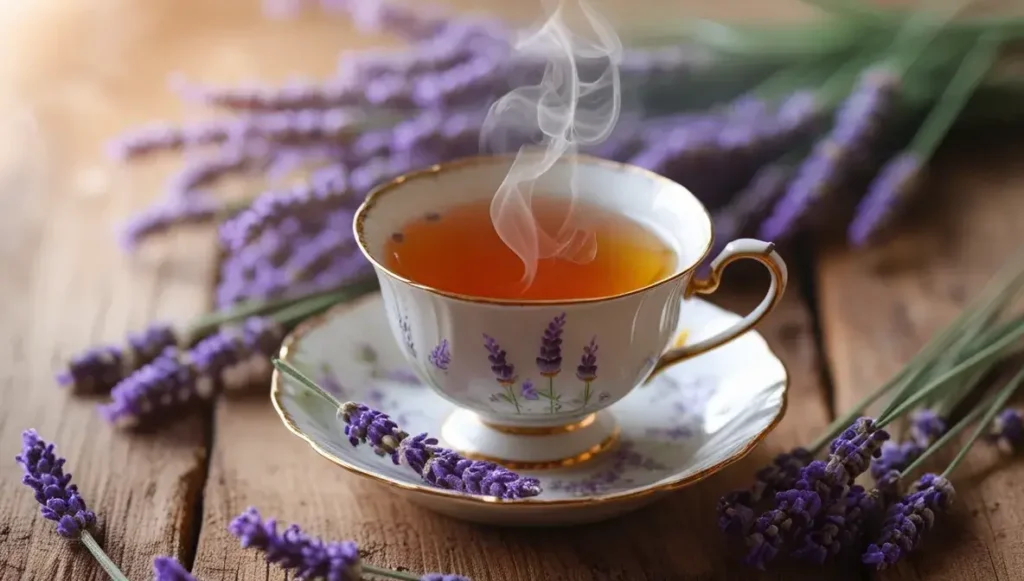
Harnessing the sleep-promoting powers of lavender tea requires proper timing, dosage, and preparation. Let’s explore how to maximize its benefits for your nightly routine.
Best time to drink lavender tea
For optimal results, drink lavender tea 30 to 60 minutes before bedtime. This timing works perfectly as it allows your body to absorb the calming compounds while giving you time to wind down naturally. The mild sedative effects begin to take hold gradually, helping your nervous system transition from activity to rest mode.
Creating a consistent bedtime ritual around your tea consumption amplifies its effectiveness. Turn this into a nightly practice by dimming the lights, silencing electronic devices, and finding a quiet space to enjoy your tea. First and foremost, the ritual itself becomes a powerful sleep cue, signaling your body it’s time to rest.
How much to drink for sleep benefits
Studies suggest that stronger preparations yield better results—research found 2g lavender tea bags produced greater sleep improvements than 1g options. Typically, one cup before bed is sufficient to experience the calming effects.
To prepare a perfect cup, boil 8 oz of water, then place 4 teaspoons of fresh lavender buds into a tea ball or sachet. Allow it to steep for approximately 10 minutes to release the beneficial oils and compounds. If fresh buds aren’t available, dried lavender works effectively as well.
Combining lavender with other herbs like chamomile
The partnership between lavender and chamomile creates a particularly potent sleep aid. These herbs work together to provide complementary benefits—lavender calms your mind primarily, whereas chamomile helps settle your nervous system and supports healthy digestion.
Other excellent herbs to pair with lavender include:
- Passionflower
- Magnolia
- Lemon balm
To create your own sleep-enhancing blend, try this simple recipe: Heat milk until hot (not boiling), add a lavender tea bag along with half a teaspoon of dried chamomile or a chamomile tea bag, steep for 5-6 minutes, then sweeten lightly with honey if desired. Essentially, this warm mixture serves as both a relaxing beverage and a sensory experience.
The U.S. Food and Drug Administration labels lavender as “generally recognized as safe”, making these combinations a low-risk option for most people seeking better sleep naturally.
👉 Discover the Ultimate Lavender Tea Blend for Deep Relaxation 👈
Is Lavender Tea Safe for Everyone?
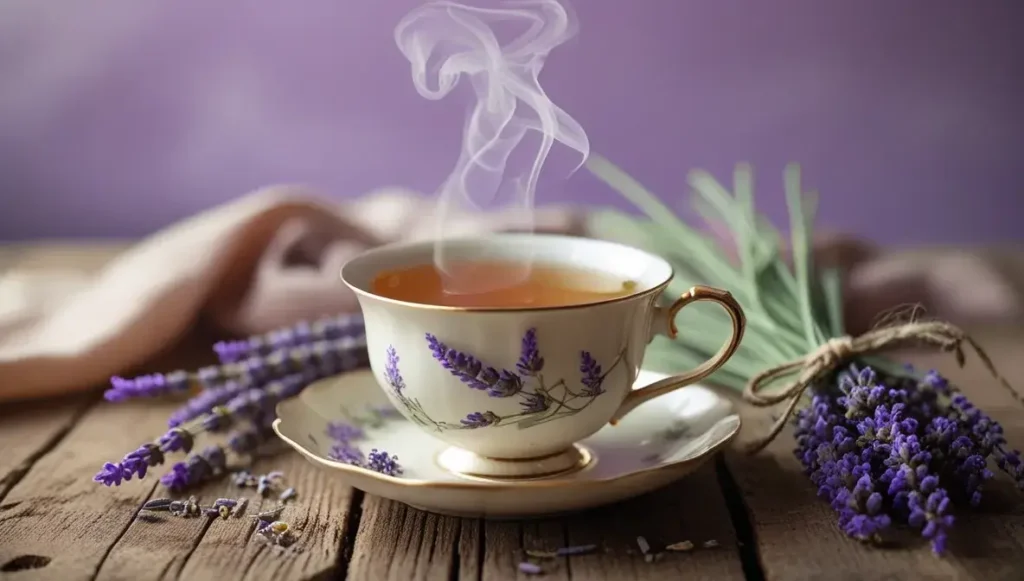
Although lavender tea offers impressive benefits, it isn’t suitable for everyone. Important safety considerations exist that may impact your decision to include it in your routine.
Potential side effects and hormone concerns
While generally safe, lavender tea can cause mild side effects in some users including headaches, diarrhea, constipation, nausea, and occasional digestive discomfort. Yet the most significant concern involves its hormone-disrupting potential. Studies have linked lavender to gynecomastia (enlarged breast tissue) in prepubescent boys. Once lavender use stops, this condition typically resolves. Research indicates that key chemicals in lavender act as endocrine disruptors by exhibiting estrogen-like properties and anti-androgenic activities.
Who should avoid lavender tea
Pregnant or breastfeeding women should refrain from consuming lavender tea as little is known about its safety during these periods. The National Institutes of Health explicitly warns against its use during pregnancy. Furthermore, anyone with allergies to lavender or similar flowering plants should avoid it, as allergic reactions can include difficulty breathing, skin rashes, and throat irritation. People scheduled for surgery should stop using lavender at least two weeks beforehand due to its effects on the central nervous system.
Safe dosage and preparation tips
For safe consumption, stick to brewing lavender tea using dried or fresh flower buds instead of concentrated lavender oils. Essential oils are extremely potent—a single drop may contain compounds from multiple pounds of flower buds. Whenever possible, choose organic lavender sources to avoid potential contamination with chemicals or fertilizers that could cause negative side effects. Always follow recommended dosages, typically one cup before bedtime.
Conclusion: Drinking Lavender Tea for Relaxation and Restful Sleep
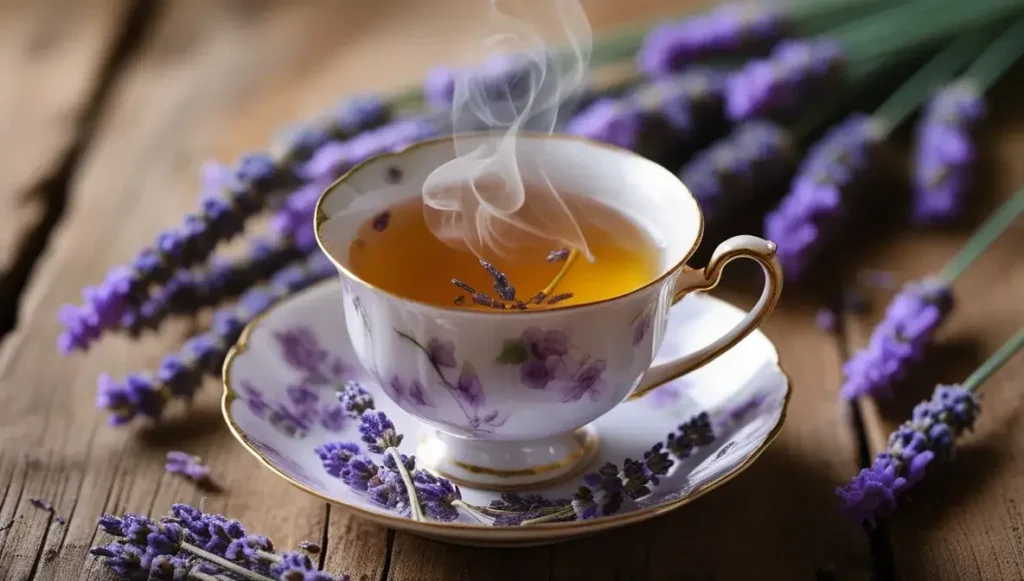
Lavender tea undoubtedly offers compelling benefits for those seeking better sleep through natural methods. Throughout this article, we’ve seen how lavender’s active compounds—particularly linalool and linalyl acetate—create powerful calming effects by influencing GABA receptors and regulating key hormones like melatonin and cortisol. This scientific backing validates what traditional medicine practitioners have known for centuries.
Beyond sleep improvement, lavender tea provides numerous additional health advantages. The anti-inflammatory properties help manage pain, while its digestive benefits soothe upset stomachs. Many people also appreciate lavender’s ability to strengthen immune function and ease respiratory issues. Perhaps most significantly, its anxiety-reducing effects make lavender tea a valuable ally against our modern stress-filled lifestyles.
For optimal results, remember to enjoy your cup 30-60 minutes before bedtime, allowing those beneficial compounds adequate time to work their magic. You might also consider creating your own blend with complementary herbs like chamomile or lemon balm for enhanced effects.
Nevertheless, lavender tea isn’t suitable for everyone. Pregnant women, those with hormone sensitivities, and people scheduled for surgery should exercise caution or avoid it altogether. The occasional mild side effects still make lavender tea a safer alternative to many pharmaceutical sleep aids for most adults.
After examining all the evidence, I believe lavender tea deserves consideration as part of a holistic approach to better sleep. This simple, fragrant ritual might just transform your bedtime routine, helping you drift into deeper, more restorative sleep—naturally. Sweet dreams await in your teacup!
Key Takeaways
Science confirms that lavender tea can indeed make you sleepy through proven mechanisms that promote relaxation and better sleep quality.
• Lavender tea works through brain chemistry – Active compounds linalool and linalyl acetate enhance GABA receptors, boost melatonin, and reduce cortisol for natural sleep promotion.
• Drink 30-60 minutes before bedtime – One cup made with 2g lavender (4 teaspoons fresh buds) steeped for 10 minutes provides optimal sleep benefits.
• Multiple health benefits beyond sleep – Reduces inflammation and pain, supports digestion, boosts immunity, improves respiratory health, and significantly decreases anxiety.
• Not safe for everyone – Pregnant women, those with hormone sensitivities, and people scheduled for surgery should avoid due to potential endocrine-disrupting effects.
• Combine with other herbs for enhanced effects – Pairing lavender with chamomile, passionflower, or lemon balm creates more potent sleep-promoting blends.
The FDA recognizes lavender as “generally safe,” making it a low-risk natural alternative to pharmaceutical sleep aids for most adults seeking better rest.
👉 Unwind Instantly with Our Superior Certified Lavender Tea Blend 👈
FAQs
Q1. How does lavender tea promote better sleep? Lavender tea contains compounds like linalool and linalyl acetate that enhance GABA receptors in the brain, boost melatonin production, and reduce cortisol levels. This combination of effects helps calm the nervous system and prepare the body for sleep.
Q2. When is the best time to drink lavender tea for sleep benefits? For optimal sleep benefits, it’s recommended to drink lavender tea 30 to 60 minutes before bedtime. This timing allows your body to absorb the calming compounds while giving you time to wind down naturally.
Q3. Can lavender tea help with anxiety and stress? Yes, lavender tea has been shown to significantly reduce anxiety and stress. It stimulates the release of neurotransmitters like serotonin and endorphins, which create a powerful relaxation response in the body.
Q4. Are there any side effects of drinking lavender tea? While generally safe, some people may experience mild side effects such as headaches, nausea, or digestive discomfort. It’s important to note that lavender can have hormone-disrupting effects, so it should be avoided by pregnant women and those with hormone sensitivities.
Q5. Can lavender tea be combined with other herbs for enhanced effects? Yes, lavender tea can be combined with other herbs like chamomile, passionflower, or lemon balm to create more potent sleep-promoting blends. These combinations can offer complementary benefits for relaxation and improved sleep quality.
